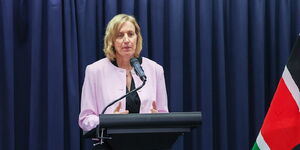A damning feature aired by NTV on Sunday, November 10, left the nation in shock as an investigative journalist, Dennis Okari, laid bare how elements within parliament were privy to a shocking poisoned maize scandal.
Speaking to Okari, the former Member of Parliament for Naivasha Constituency, John Mututho, claimed to have personally witnessed legislators receiving loads of cash from within parliament premises to quash the Report on Food Security Status and the Maize Shortage in the Country that was tabled at the national assembly on April 2009.
"In fact, they received bribes inside parliament itself and when I was debating that evening I could see one gentleman with a big bag up there in the speaker's gallery dishing out cash," Mututho claimed.
"Eventually I was alone debating against the likes of Orengo, the like of Raila, the likes of Ntimama, and all the others, 72 of them against me, all the other legislators needed to pass a vote had simply disappeared," he added.
Ndaragwa MP Jeremiah Kioni echoed Mututho's sentiments, adding that the legislators received as much as Ksh18 million per head from powerful lobbyists to just walk out thereby killing the motion from the onset.
According to Mututho, the former Kenya Bureau of Standards MD Kioko Mang’eli was traumatized by pressure from powerful forces within the government who were out to muzzle him before he publicized the contentious maize consignment that was aboard the MV Fonarun Naree in Mombasa.
"People in Kenya have a bad habit, poisoned maize is rejected at the port of Mombasa, then the ship makes a long u-turn and comes back with fresh papers and the maize is somehow accepted," Mututho stated.
The former KEBS boss had written to the then Managing Director at the National Cereals & Produce Board (NCPB) Gideon Misoi, highlighting the potential hazards that would arise if the general population was exposed to the poisonous maize.
"From past experiences, maize with moisture contents of more than 13.5 per cent have resulted in the development of moulds that produce aflatoxins that have adverse effects on both animals and human beings," read an excerpt of the late Mang'eli's letter.
His letter was also sent out to Professor John Lonyangapuo who was serving as the Permanent Secretary in the Ministry of Industrialization at the time.
The government on its part passed the information to Kenya Plant Health Inspectorate Service (KEPHIS), who suspiciously gave the maize consignment a clean bill of health, despite the state agency lacking the equipment necessary for aflatoxin testing.
"Currently the machines for testing aflatoxins are out of order though being repaired, they are using SGS laboratories (subcontracting) for such test and others," read a section of a KEPHIS internal memo.
Mang'eli passed away on March 14, 2019, from pressure-related illnesses.
The damning report came just a day after KEBS banned the sale of several brands of flour over alleged toxic aflatoxin levels.












